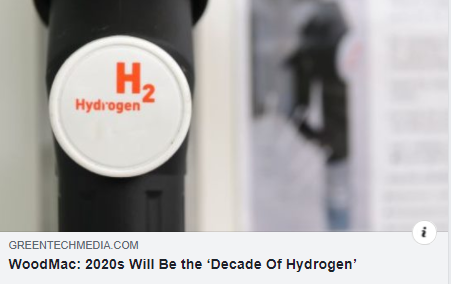The 2020s Will Be the ‘Decade Of Hydrogen’ — Really?

Falling costs and growing project pipelines will ensure the 2020s are the “decade of hydrogen,” according to new research from Wood Mackenzie.
Over the past 10 months, the global green hydrogen project pipeline has swelled from 3.5 gigawatts to more than 15 gigawatts.
Green hydrogen (which is derived from renewable energy used to electrolyze water – ed) is considered by many to be a vital component of any credible net-zero carbon plan, and it can be used to decarbonize a number of industrial processes and heavy transport. (Check out GTM’s green hydrogen explainer here.)
As it stands, hydrogen derived from fossil fuels are cheaper than using renewable-energy-powered electrolyzers to produce green hydrogen from water. But green hydrogen is drawing increasing interest from oil majors and utilities alike, from Shell to NextEra Energy. And Wood Mackenzie’s research indicates that the cost of green hydrogen will fall by 64 percent by 2040 as the market scales up.
“On average, green hydrogen production costs will equal fossil-fuel-based hydrogen by 2040,” said Ben Gallagher, Wood Mackenzie senior research analyst and author of the new report, in a statement. “In some countries such as Germany, that will arrive by 2030. Given the scale-up we’ve seen so far, the 2020s will likely be the decade of hydrogen.”
“Rising fossil fuel prices will boost green [hydrogen’s] competitiveness, further strengthening the case for this technology in the coming years,” Gallagher said.
My viewpoints:
We’ve been hearing about the coming “hydrogen economy” since the early 1970s, when the OPEC oil embargo brought the U.S. to its knees. Of course, that doesn’t mean it won’t happen, but it’s been moving along like molasses for the last 50 years.
The only good thing about hydrogen is that, once you have it, it’s cheaper to store than electricity, at least for now.
Generating hydrogen cleanly, i.e., from the electrolysis of water, requires expensive and inefficient equipment (electrolyzers). There are other ways of generating hydrogen, but they consume fossil fuels, the processing of which releases CO2 into the atmosphere.
The transportation and distribution (T&D) of hydrogen is expensive, as the delivery infrastructure is nascent, putting it charitably. By contrast, we have a fantastic infrastructure for electricity T&D (the power grid).
Converting the hydrogen back into electricity for use in transportation is done via fuel cells, which are expensive and fragile.
Now, I grant that the challenge (cost/fragility/efficiency) of the hardware required for hydrogen is improving, but so are batteries. To say, “The cost of green hydrogen will fall by 64 percent by 2040,” without mentioning projected improvements in batteries is disingenuous on a good day.
